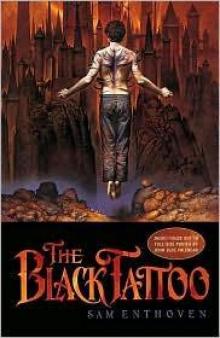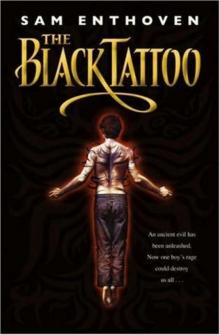- Home
- Sam Enthoven
Black Tattoo, The Page 12
Black Tattoo, The Read online
Page 12
"Sure, whatever," said Charlie, "but... well, you know, isn't Hell supposed to be where you go after you're dead? I mean, normally?"
The demon thought about this for a moment.
"Mm," it said finally. "You are referring, perhaps, to some sort of belief system in the place where you come from."
"Sorry?"
"What do your people believe?" asked the Scourge patiently. "What do your people think happens after death?"
"Oh," said Charlie, surprised. He had to think for a moment.
"Well, some of them," he began. "Not me, obviously, but some of them believe that, you know, when you die, there's a couple of possible things that could happen. If you've been good, if you've led a good life, then you go to, er... Heaven."
He broke off and looked at the demon, to see if he was getting this across properly. It was impossible to tell.
"It's supposed to be a nice place," said Charlie, doing his best. "You know, eternal happiness. That sort of thing."
"I see," said the Scourge.
"And if you've been bad," said Charlie, "then you go to this other place. A bad place, where bad things happen to you. Fire. Brimstone. Eternal torment or whatever. And that's Hell."
"That is what you believe?" asked the Scourge, with a smile in its voice.
"Not me," said Charlie quickly. "Just, you know — some people."
Slowly at first, but with gathering speed, something strange was happening to the demon: it was trembling. In another moment, it was quaking all over, big shudders running all over its liquid black body.
"What?" asked Charlie. "What is it?"
But then he realized what it was. The Scourge was laughing.
"I'm sorry, Charlie," it said, once it had managed to get itself back under control a little. "But that's very funny."
"Why?" asked Charlie, annoyed.
"I knew your people were primitive, but really," it said, "that's—"
"What?" said Charlie.
"In backward, unenlightened societies," it said slowly, "it is possible to control people by means of what they believe. This belief system of yours: it's a perfect example."
"Oh yeah? And why's that?"
"Think about how it works," said the Scourge. "If you're good, if you do what you're told, then when you die you'll go to... where was it?"
"Heaven," said Charlie.
"Yes," said the demon. "But if you're bad, if you don't do exactly what everyone says is the right thing to do, or behave as you're told to behave, then—"
"You'll go to Hell," finished Charlie.
"Exactly. Charlie," said the Scourge, "You must understand that beliefs like those you've described are for the weak. They make you easy to control, and they can be comforting too: it's so much simpler to make decisions about how to live your life when all the guidelines are set out in front of you. Look at me."
Obediently, Charlie turned to look at the Scourge's face. In the blank shiny blackness that he found there, his own reflection stared back at him.
"The only way to make a decision is of your own free will. You yourself must weigh up the consequences for and against and make your choice accordingly, without anyone else telling you what is right and what is wrong. That is what free will is all about."
Charlie didn't answer; he just stared at himself, reflected in the demon's face.
"There is something," the Scourge began, "that I need you to help me to do. It will not be easy, but the rewards will be great."
"What is it?" asked Charlie.
"I will tell you," said the demon, "but not just yet. I have something else to ask of you first."
"And what's that?"
"Charlie," said the Scourge, "I want you to trust me."
Charlie stared.
"Trust you?" he echoed. "Trust you? Well, let me think about that for a second. No."
"No?" said the Scourge, surprised.
"Come on!" said Charlie. "What do you think I am — stupid? It's all very well, you coming on like 'the Snowman' and giving me the guided tour now. A little late, though, don't you think?"
"Charlie—"
"You tricked me! You made me think I had superpowers, when all the time you were possessing me! Taking me over! Using me so you could get what you want! And then you..." He remembered the moment he'd realized what the demon had done through him. He remembered Esme's face as she'd vowed her revenge. He shuddered.
"Give me one good reason," he said.
"Because I'm offering you the choice," the Scourge replied.
Charlie stared again. "What?"
"You know what I can do, Charlie," said the demon simply. "You know the power I can wield over you. And yet you see that I do not use it."
"So?"
"I think that by the time you have seen what I plan to do," the Scourge explained, "you will want to do it every bit as much as I do. And we can work so much better, I think," it added, "as a team."
It paused.
"Let me be your guide," it said. "Let me show you what I'm planning. Trust me that much at least."
"And if I decide I don't want to help you with whatever you're doing, then what?" asked Charlie. "You'll let me go home?"
"Back to your world?" asked the Scourge, surprised again. "Back to your family, or what's left of it?"
"Hey!" said Charlie.
"I'm sorry," said the demon, "but it seems hard to believe that you'd want to return, with things as they are right now."
"That's not the point!" said Charlie — loudly, because the Scourge had reminded him of something he didn't want to think about.
"Of course," said the Scourge soothingly, "you are free to choose. You have my word." It looked at him, waiting.
Charlie thought about it.
He looked down at Hell, far below him, laid out under his feet as if just for him. He looked at the palace and the surrounding fantastical landscape that spread to the horizon in every direction. No one on Earth had been where he was. No one on Earth had seen what he was seeing. Looking around, Charlie suddenly had a very powerful impression that the whole world — the whole universe, maybe — revolved around where he was standing (or floating, to be strictly accurate).
Then he thought about a Chinese restaurant in London's West End and the last time that he'd seen his father. He thought about the abandoned meal and the things that they'd said to each other — things, in his opinion, that could never be taken back. He thought about his mother, who was probably still waiting for him at home and wondering already where he was. He thought about the hateful mess his father had made of their lives by leaving them the way he had — and he briefly considered whether, frankly, he could really be bothered with any of it.
Stay or go back. Those were his choices.
No contest.
"Okay," said Charlie. "Show me."
FRESH MEAT
Jack woke with a jolt, looked up — and stared.
He was in a throne room of some kind — that was the first thing he noticed: an immense, cavernous, dome-shaped space with a raised circular dais at its center. Jack was kneeling on a narrow strip of bloodred carpet, and to either side, forming the rest of the floor of the room, was a huge and glittering gray-blue expanse of... what? Jack frowned as he realized that the floor was moving — bulging and rippling like an oily sea. But then he looked up and found himself staring even harder.
Just next to the throne, dipping slightly in the air as it made a small movement of its tail, was what appeared to be... a shark.
The shark was very big — thirty feet long at least. Its torpedo-like body was crisscrossed with a network of horrible puckered scars; its blank gray eyes glinted at Jack like gun barrels — and it was floating in the air, just hovering there, as if this were the most natural thing in the world.
The shark — and the throne room — were already, frankly, just a little bit more than Jack felt able to cope with at this point.. But as if these things weren't enough on their own, there was the throne itself and the strange
figure that sat on it.
He looked like a man — or most of him did. His gleaming white three-piece suit was immaculate and well cut; his jet-black hair was elegantly tousled, and his goatee beard and narrow sideburns were so neat they looked like they had actually been sharpened. But there were also, Jack noticed, several weird things about him, too. The skin of the man (if man was the right word) was unmistakably red. His hands, which were folded in his lap, were actually more like hooves, with stubby black spur things instead of thumbs. And the worst thing — the thing that made Jack actually shiver as he looked at him — was his eyes.
They were golden, with black vertical slits in them instead of pupils. They were not human eyes, and the look they were giving him was not a friendly look: the expression on the man's face was the kind you might give to a really large spider that you've just found in your bath. "Who are you?" he said.
"J—" said Jack, then found his voice. "Jack Farrell," he said. "Sir."
The man arched his perfect black eyebrows. "That's not much of a name."
Jack found he didn't really have anything to say to that, so there was a pause.
"Are you... the Devil?" Jack asked finally.
The man frowned. "I've never heard that word before. Say it again."
"The Devil."
"No. The name means nothing to me. I may add it to my collection, though." The man sat up straight on his throne, and his chest swelled as he prepared to speak.
"I am Ebisu Eller-Kong Hacha'Fravashi," he said. "God of Rulers, God of the Dead, God of Darkness, God of Gods. I am the Voice of the Void, whose breath is the wind and whose rage makes all worlds tremble. I am Lord of Crossing-Places, King of all Tears, and the Suzerain Absolute of the Dominions of Hell."
"Er... pleased to meet you," said Jack.
"You will address me as 'Emperor'," said the man on the throne. Beside him, the shark's mouth hinged open in a wide and meaningful grin — and Jack decided that now wasn't a good time to argue.
"Pleased to meet you," Jack repeated, "Emperor."
"This," said the Emperor, gesturing at the giant flying shark with one cloven red hand, "is Lord Slint. You find his presence... off-putting?"
"A little bit," Jack admitted, "yes."
The Emperor smiled. "You may leave us, Slint," he said. And as soon as the words were spoken, the shark lunged.
Jack ducked — he couldn't help himself — but the shark, all thirty feet of it, had already passed over him and away, making for the giant doors that stood behind where Jack was kneeling. They were a hundred meters off, maybe more. In the second or two it took to cross the distance, Jack watched the shark's easy, undulating movement and the sinuous way it slipped through the doors and out of sight.
"Now," said the Emperor, leaning forward on his throne. "We have a rather pressing matter to discuss, do we not?"
"We do," queried Jack. "Er, Emperor?" he added.
"Indeed we do."
There was another pause.
"Come now," said the Emperor, when Jack continued to stare at him. "You have just made use of the same crossing-place that the Scourge employed to return from your world. It may interest you to know that the Scourge's reappearance has come as something of a surprise to me. Khentimentu's banishment was long ago considered purely a matter of myth among my people: the Scourge's very existence was cause for conjecture, right up until its return. And the discovery that its incarceration took place in a world of which all records appear to have been lost is of no small interest to me also."
Jack just kept looking at the Emperor, waiting for whatever he was going to say next.
The Emperor sighed. "It appears I must be blunt." The golden stare narrowed and sharpened. "Why are you here?"
"Oh," said Jack. "I'm, ah, her for my friend, Emperor," he added, as the man on the throne continued to stare at him.
"You don't mean the Scourge's vessel," said the Emperor, with an expression of distaste. "Do you?"
"His name's Charlie," said Jack. "Emperor," he added again (getting a bit tired of doing it, to be honest).
"And what, may I ask, do you propose to do when you find this 'Charlie'?"
"Well, I want to rescue him," said Jack, feeling his ability to deal with this whole situation finally begin to leak out of his ears. "You know, take him back home."
"Let me get this quite clear," said the Emperor, sitting back. "You've come, alone, unaided, into my kingdom, to find your... 'friend,' release him from the Scourge's influence, and bring him back with you to wherever you came from?"
"That's about the size of it," said Jack. "Yeah."
For another long moment, Jack and the Emperor just looked at each other.
"Your story is ridiculous," said the Emperor finally. "And this encounter has already taken up more of my time than I am prepared to waste."
He drew himself up, staring down at Jack.
"You will be taken to Slint's gladiator pits," he announced. "There you will be pitted against the finest fighters of all my dominions, and we shall see how well you fare. If your performance proves diverting, I may perhaps grant you a boon, such as a privileged position from which to watch the invasion and conquest of your world. But it is my suspicion," the Emperor added, "that you will fail and die. Goodbye."
Like most of the rest of the conversation, this last bit had pretty much gone over Jack's head. At any rate, the Emperor sat back on his throne, and Jack suddenly found that he did not have time to think about it any further.
The surrounding stuff from the floor of the throne room — the stuff he'd noticed moving earlier — was now flooding out over the sides of the carpet and running up Jack's legs. In another second, Jack's whole body was covered in a weird, clammy, grayish-blue jellylike substance that clung to him all over, locking him in position: any effort to struggle produced no result whatsoever. He was helpless as the jelly stuff ran up his neck, quickly spreading all over his head and then — revoltingly — his face. There was a squeezing sensation. A moment of unbelievable tension, then—
Darkness.
Presently, Jack opened his eyes again and sat up.
The room he was in now looked very small after the throne room: more like a cell, really. The floor was bare earth, reddish and dusty. The walls were smooth yellow stone, forming the room into a perfect square of maybe fifteen feet by fifteen, with no door, no apparent way in or out, except through the ceiling, which, Jack suddenly realized, wasn't there. The walls simply stopped, some thirty feet above him. Obviously his cell was only a part of some much larger room — and that, for the time being, was all Jack really cared about in that direction.
Not wanting to stand up just yet, Jack crawled over to one of the walls and sat there, with his back to it, his arms huddled round his legs.
He was frightened. Terrified, in fact. Large parts of his brain were wibbling and gibbering to themselves, quietly yet with gusto. Single words like Hell and shark played leapfrog in his head, amongst the more prosaic ones like Help!, No! or AAAAAAAAAAARRGH!
There were, he decided after a moment, two main approaches to this thing.
The first, the obvious one, was to give up: to burst into tears, scream himself hoarse, or start banging his head against the wall. All these options were certainly tempting. There was a strong swelling sensation in his chest and stomach and a hot wetness behind his eyes that wouldn't need a lot of encouragement. He was alone, in Hell. Approach one was very attractive indeed.
But then there was approach two, which went something like this.
Whatever was going to happen was obviously going to happen whether he liked it or not. (Easy, he himself, as he started to panic again. Easy. Come on, think it through.) Well, if that were true, there was a possibility, however remote it might turn out to be, that he might — at some future moment — find some way of making things less unremittingly awful for himself. Opportunities might come (he told himself): chances might present themselves — and it would be a lot easier to spot these and take adva
ntage of them if he didn't let himself go completely off his chump and start gurning like a man whose nostril hairs were on fire. He was in Hell, he told himself. All right, that much was obvious. But what that meant, what that would actually involve, was yet to become clear. Besides, there was something else about this situation, he saw: something familiar and, oddly, rather comforting.
Here he was, on his own in, apparently, an ultimately horrible position. And why was that?
Because, simply, that was the way things always seemed to turn out for him.
It was an extreme example, the scenery was different and so forth, but the fact was that, really, when it came to the sort of luck Jack had come to expect in his life, this was nothing more or less than business as usual.
What this was, in fact, he thought, as he flexed his legs and (using the wall for support) pushed himself upright, was absolutely, devastatingly...
"Typical," he finished aloud.
"Hello?" said a voice, making Jack nearly jump out of his skin. "You awake in there? You hear me?" The voice was high and scratchy, like sharp stones grating against each other.
"Y-yes," croaked Jack. Then he tried again. "Yes!"
"Shhh! Not so loud!" hissed the voice. "What's your name?"
"Jack," said Jack.
For a moment, there was silence. Then, "Hur," said the voice.
"What?" asked Jack.
"Hur, hur, hur."
Jack frowned.
Hur, hur, hur, hur," he heard. "Hee hee hee HEE!"
"What's so funny?" asked Jack, an irritating whining note coming out with the question before he could stop it. The scratchy laughter ceased abruptly.
"Thass not your name," said the voice.
Jack stood in silence, staring at the wall in the direction the voice was coming from.
"Fresh meat," said the voice. "Thass your name."
HOME
Esme lay on the floor of the Light of the Moon, in darkness, remembering.
"You lost," said Raymond.
Esme lay flat on her back. What had just happened had happened so fast that she hadn't even broken her fall properly: her head still rang from the impact as she'd hit the floor, and her vision was full of darkness. In the middle of it, she could see the big man was standing over her. His face was flushed and sweaty but he was grinning from ear to ear, delighted.

 The Black Tattoo
The Black Tattoo Black Tattoo, The
Black Tattoo, The Crawlers
Crawlers TIM, Defender of the Earth
TIM, Defender of the Earth